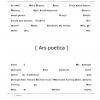Zenon Fajfer is a Polish writer, editor and popular figure/creator in the “liberature” movement, a literary group focused on “the indissoluble bond with the physical space of the text book” (Puzdro Magazine). Much of Fajfer’s work is hyper-textual and interactive, requiring the reader’s involvement in order for the poem to progress.
“Ars Poetica” is an electronic poem presented as a short textual animation. The first screen presents a collection of words and fragmented sentences. In the middle of the screen sits the title of the poem in a much larger font and enclosed within square brackets—“[Ars poetica]”. Though fragmentary and separated by blank spaces, the words and phrases surrounding “[Ars poetica]” evoke the poem’s central narrative or concept; the first letter of each word is in bold, indicating a logic in arrangement and meaning that will unfold as the poem progresses. The first such textual fragment reads “It’s me?”; this is followed by a stream of words and phrases like “Milky Oceans,” “A cup?” and “Inside new screens.” A “start” button sits enclosed in square brackets at the bottom of the screen. After the button is clicked, the large [Ars poetica] font disappears and new words form from the bolded first letters of the previous words. Because these new words are simply letters extracted from the original words, each letter is spaced out on the screen until the process completes and the last word on the screen forms. The spaced-out letters then collapse into the left side of the screen, creating the words “ImMORTal,” “NAkeD,” “spAcE,” “InsIdE,” “dREamiNg,” “eye,” “tIMe,” “oVer,” “wait,” afTErWards,” “ruN” and “down;” together, they form the sentence: “immortal naked space inside dreaming eye / time over wait afterwards run.” The words then transform into “INsIde” and “toward.” Finally, these two words dissolve into the poem’s final word, which is large and in bold print: “it.” As every word in the poem is derived from the letters of previous word, the final “it” comes to embody the linguistic and philosophical core of the poem. With its appearance on the screen, the user is prompted to click the “rewind” button and watch the poem in reverse.
Fajfer’s ties with the liberature movement, perhaps, shed some light the title, “Ars Poetica.” Aligning with the liberature emphasis on the physicality of a text, Fajfer’s work demonstrates that the fluidity of interpretation can be expressed concretely in poetic form—in this case, a composition that exploits the functionality of the electronic platform to achieve structural fluidity.
Works cited
Puzdro. “Liberatura.”Puzdro Magazine 1 (2005): 16. Web. 25 April 2011.
Travis Spahmann was a student of Dr. Kiki Benzon for a course in Contemporary Fiction taught at the University of Lethbridge, Canada during the Winter term of 2011.


